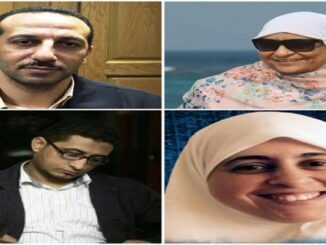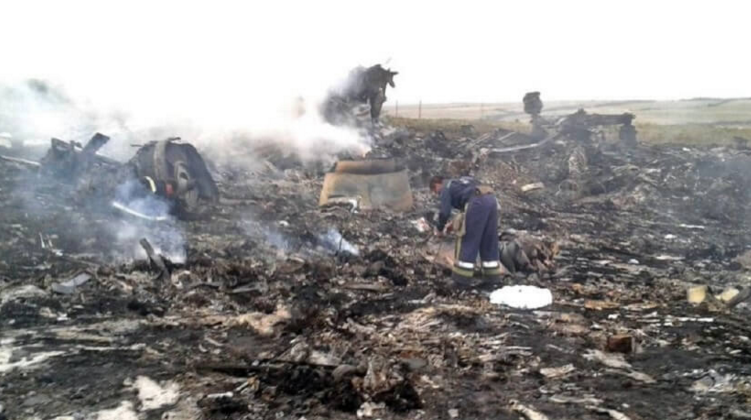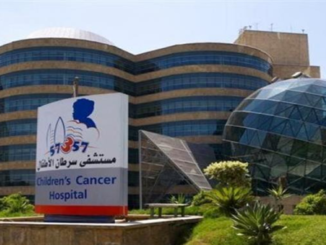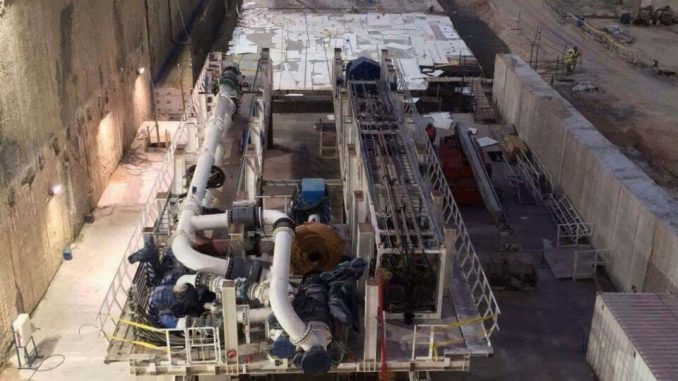
Exclusive to Middle East Observer, Six Huge Tunnels near Sinai Borders
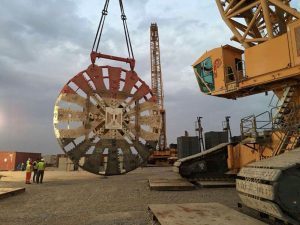
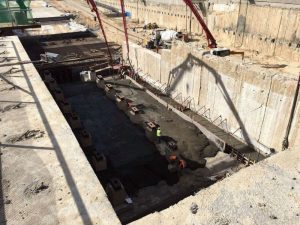
Middle East Observer (MEO) was able to get exclusive photos from the site of building 6 news tunnels in Sinai . The Egyptian government has announced that they are building 4 tunnels, 1 for railway and 3 for cars but haven’t announced anything related to the other 6 tunnels.
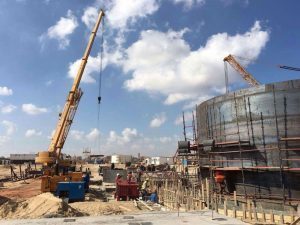
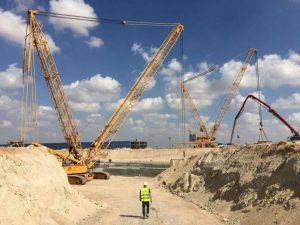
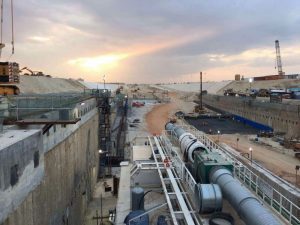
MEO knew that the construction companies belong to the army in addition to few private companies, including Orascom, which is owned by the Sawiris family, an economic tycoon close to the government.
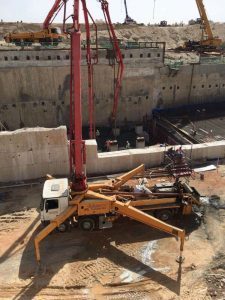
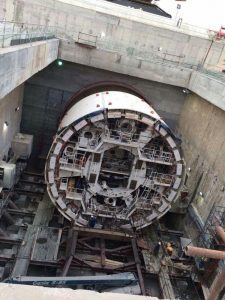
Egyptian-Israeli relations under Al-Sisi Regime
Israel ambassador in Cairo says “Egyptian-Israeli relations passing its best times”
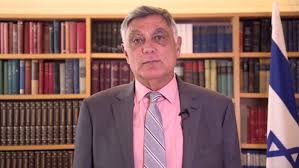
Israel Ambassador in Egypt Haim Koren’s stated that the Egyptian-Israeli relation is passing by its best times. The veteran diplomat posted in Egypt since 2014 said, “This is one of the best times we’ve ever had” in terms of cooperation between governments.
Koren continued,”There’s good cooperation between the armies, we have understandings about the Sinai Peninsula, and basically, we see (eye-to-eye) on the development of the region.”
Since al -Sisi reached power by a military coup in 2013, the Egyptian-Israeli relations have witnessed one of its flourishing time. Israel has become an important ally to Abdel-Fattah al-Sissi, along with Saudi Arabia and wealthy Gulf Arab countries.
Al-Sisi was supported by the Gulf States to overthrow Mohammed Morsi in 2013 as they were against having a successful precedent in Egypt. The Gulf countries were against the Arab Spring protests that would shake their status.
Al-Sisi isolates Hamas
Moreover, al-Sisi has also assisted Israel in isolating Hamas Resistance Movement ruling the Gaza Strip. Israeli military officials praise Egypt’s crackdown on Hamas’ cross-border smuggling tunnels, which had been a main conduit for weapons into Gaza, and say the Egyptian military is doing an admirable job in a fierce battle against IS militants in Sinai.
Hamas had close ties with the former Egyptian leader and is rooted in Morsi’s Muslim Brotherhood.
In the same context, Israel usually praises al-Sisi for his tough policies against Islamists, and considers him a key partner in the war against Islamic “extremists”.
ISIS-Affiliated Province of Sinai
Egypt and Israel military cooperation have flourished recently with the growing power of the ISIS-affliated group in Sinai Peninsula. Accordingly, Israel has allowed Egypt to move heavy weapons like tanks, artillery, and attack helicopters into the restive Sinai Peninsula. The two sides also are considered to have close intelligence ties.
Despite the two governments’ close ties, but the Egyptian-Israeli relation is still rejected by the Egyptian public opinion.
Al-Sisi-Netanyahu distinguished relations
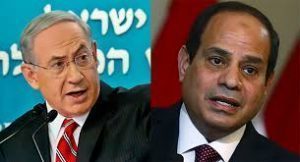
In addition, Israeli Prime Minister Benjamin Netanyahu and al-Sisi often speak on the phone. Last May,al-Sisi said that Egypt’s relations with Israel could be warmer if it made peace with the Palestinians. In response, Netanyahu welcomed al-Sisi’s initiative and he praised what he described as al-Sisi’s “willingness” to help advance the peace process with the Palestinians.”
Koren said, “We have common enemies in the sense of terrorism, or if you like, radical Islamic terrorism, emerged from the same root no matter if it happens to be Hamas or the Muslim Brotherhood, ISIS, Jabhat al-Nusra or al-Qaida,” Koren said. He added, “understood quickly that we are all in the same boat.”The outrageous reached its peak followed the 2011 January Revolution when outraged crowds surrounded the Israeli embassy in Cairo over the killing of five Egyptian policemen by Israeli forces chasing militants in the Sinai. Since the incident, Israel closed it embassy and didn’t reopen its embassy, until September 2015.
Full normalization with Israel rejected
In the same context, political figures across Egypt still reject full normalization of Egyptian-Israeli relations, with many professional associations and labor unions banning members from visiting Israel.
Last year, Egypt’s parliament voted to expel a MP after he had dinner at the Israeli with Koren and a newspaper published a photo of Koren with devil’s horns superimposed on his head.
Moreover, any attempt to reach the Egyptian public opinion is faced in return by rejection. Earlier this year a new Arabic-language Facebook page set up by the Israeli embassy was flooded with insults and anti-Semitic comments, with some likening Jews to pigs and others calling them killers over the long-running conflict with the Palestinians – a popular hot-button topic in Arab countries.
Koren said, “Our aspiration is to come closer to the Egyptian people,” through cultural policy and social media. “But we understand, it’s a long process, there’s a long way to go. That’s why the stability of Egypt is important, and also the success of its economy.”
In addition, Koren described the economic relation with Egypt to be very slow saying that despite the successful free trade areas for manufacturing known as QIZ zones, “it’s going very slow” with regard to developing Israeli expertise in sectors that could benefit the Egyptian economy, such as agriculture, irrigation, and solar power.
Egypt floods tunnels on Gaza border
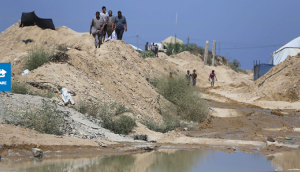
The Egyptian military has begun to pump water from the Mediterranean Sea into underground smuggling tunnels that connect Gaza Strip with Egypt, security officials and eye-witnesses said.
The operation is a cooperation between Israel and Egypt and is said to aim at ending smuggling to the Palestinian territory.
Gaza, administered by the Islamic Hamas movement, remains under a tight blockade imposed by Israel and Egypt.
The government in Cairo destroyed hundreds of homes on the Egyptian side of Rafah last year, which straddles both Sinai and Gaza, in order to create a “buffer zone”.
Egypt’s al-Sisi is ardently opposed to the Muslim Brotherhood movement, having deposed former president Mohammed Morsi, a member of the group, in a military coup in 2013. Hamas is widely considered an offshoot of the movement.
The tunnels to Gaza are used to smuggle both goods, such as clothing, medicine, and other products, and allegedly weapons.
14 Palestinians drowned in flooded tunnels
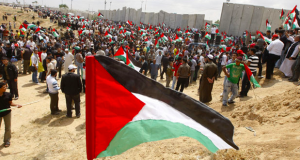
At least 14 Palestinians went missing after Egyptian military forces flooded a smuggling tunnel with seawater, according to Gazan Civil Defense rescue team.
Muhammad al-Meidana, a Civil Defense official, told Ma’an news that rescue teams had been able to save the lives of seven tunnel workers, but that contact was lost with 14 others, who were now missing.
Smuggling tunnels that pass beneath the Egyptian border have served as a lifeline to the outside world for Gaza’s 1.8 million inhabitants since Israel and Egypt imposed a crippling siege on the coastal enclave in 2007.
While the tunnels are used by Hamas as a source of tax revenue and inflow of weapons, they also supply necessary goods for Gazans including food, medicine, as well as infrastructure materials including concrete and fuel.
Egypt has sought to destroy the tunnels as part of an ongoing security campaign in the northern Sinai against anti-regime militants, which Egypt accuses Hamas of supporting, although Hamas strongly denies the accusations.
The regime in Egypt has a good cooperation with the Israeli government on security issues.
Rafah farmers devastated after area is flooded

Rafah border area inhabitants were upset after the Egyptian army has been pumping large volumes of Mediterranean Sea waters into the buffer zone that it began building two years ago, along 14 kilometers of the Palestinian-Egyptian border.
The move is the latest attempt to destroy the tunnels dug by Palestinians under the city of Rafah over the years of the Israeli and Egyptian blockade.
Farmer Nayef Abu Shallouf, who owns three acres of land less than 300 meters from the Egyptian border, said all the salt water will leave his land briny and destroy his crops. He told the news site al-Monitor, In addition to damaging the soil, sinkholes will appear wherever tunnels were dug, with collapses occurring sooner or later.
Nasser Abdullah expressed deep concerns about sinkholes that could open at any time under his home, 500 meters from the border. He explained to al-Monitor, “The tunnels run under our homes. Water flooding these tunnels will lead to their collapse and the destruction of our homes. Their foundations will be gradually degraded by salt water, even if they remained standing.
Abdel Majid Nassar, a professor of environmental engineering at the Islamic University of
Gaza, stated that the whole area will be transformed into marshland as the soil becomes saturated with water and liquefied, with the water seeping into subterranean aquifers.
Nassar said to al-Monitor that the foundations of homes close to the border will surely be affected, with those houses suffering damage and falling apart. He also explained that the pumping of seawater will have disastrous effects on Rafah agriculture and aquifers, saying, The water will also seep toward the surface and result in the salinification of topsoil, destroying agriculture there for years. Furthermore, as the topsoil liquefies, salt water will seep into the upper layers of underground aquifers, used by local inhabitants for irrigation and in homes.
He pointed out that even if the Egyptian army stops pumping seawater in the coming months, removing salt from the topsoil and fixing the ensuing damage would take years and large amounts of fresh water.
Human Rights abuses in Egypt when tunnels are flooded
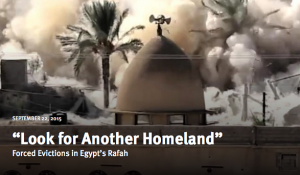
In a report titled, “Look for another homeland”, the international Human Rights organization, Human Rights Watch, focused on the illegal evictions of the inhabitants of Rafah in Egypt.
“Between July 2013 and August 2015, Egyptian authorities demolished at least 3,255 residential, commercial, administrative, and community buildings in the Sinai Peninsula along the border with the Gaza Strip, forcibly evicting thousands of people. Extended families who had lived side by side for decades found themselves dispersed, forced to abandon the multi-story houses they had built next to their relatives and passed down through generations. Some families became homeless and lived in tents or sheds on open land or in informal settlements. The Egyptian authorities razed around 685 hectares of cultivated farmland, depriving families of food and livelihood and stripping most of the border of its traditional olives, dates, and citrus groves. The evictions scattered families among the Sinai towns and villages and in some cases as far as Cairo and the Nile Delta. The Egyptian government has indicated that these evictions could continue.
The Egyptian army demolished buildings along the border in July 2013 as part of a reinvigorated but long-considered plan to establish a buffer zone with the Gaza Strip. These demolitions rapidly accelerated after October 24, 2014, when the Sinai-based armed group Ansar Beit al-Maqdis, or Supporters of Jerusalem, carried out an unprecedented attack on an army checkpoint in North Sinai governorate, reportedly killing 28 soldiers. The following month, Ansar Beit al-Maqdis pledged allegiance to the extremist group Islamic State, also known as ISIS, and changed its name to Sinai Province.
Egyptian authorities justified the buffer zone as a way to defeat the insurgency by shutting down the smuggling tunnels that they said allowed fighters and weapons to pass from Gaza to the Sinai. Since 2007, Gaza, which is governed by the Islamist Palestinian movement Hamas, has been under a strict Israeli blockade. For most of this period, Egypt has cooperated in the blockade by severely restricting the flow of people and goods between Gaza and the Sinai. Tunnels have served as a key supply line between the two sides.”

